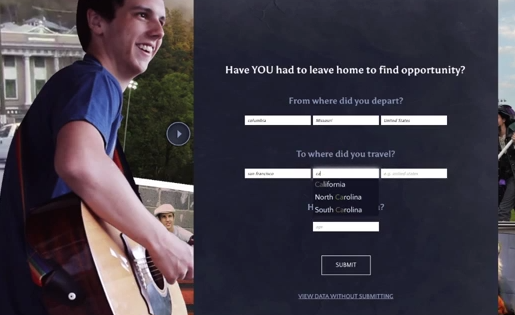This week we explore how documentary video and interactive technologies can be combined to tell new kinds of immersive, in-depth stories online.
PART 1: NPR’s “Planet Money Makes a T-shirt”
This Emmy Award-winning project, created by NPR, raised more than half a million dollars via Kickstarter to travel the world and document how T-shirts are manufactured. The resulting interactive documentary allows viewers to smoothly transition from watching video segments to reading text, photos and graphics. NPR’s supervising visuals editor Kainaz Amaria explains the team approach used to build this kind of immersive project.
Reporting by Tatiana Darie, Reuben Stern and Rachel Wise.
[To skip directly to this segment in YouTube, click here.]
Additional NPR resources:
The NPR Visuals Team also develops data-driven tools and shares the code for others to use, including the source code behind the T-shirt project.
PART 2: “Hollow”
“Hollow” is a multi-storyline experience that examines the future of rural America by focusing on a single county in West Virginia. Director Elaine McMillion Sheldon tells us how the project involves the audience via multimedia elements and integration of social media tools.
Reporting by Tatiana Darie.
[To skip directly to this segment in YouTube, click here.]
More information about the project:
As MediaShift reports, the original plan was to make a documentary and not an interactive project, but the director “realized there was more information she wanted to present than could be conveyed in a traditional documentary.” She also saw the interactive format as a way to enable to community to continue documenting their own story after the filmmaker left.
Additional information about the project can be found on the project website and on the project’s Kickstarter page.
PART 3: “Fort McMoney”
“Fort McMoney” is documentary game that allows viewers to build player profiles and influence the course of the story, which is based on a real-life community in Canada. Director David Dufresne explains how the project simultaneously entertains and informs.
Reporting by Tatiana Darie.
[To skip directly to this segment in YouTube, click here.]
Other examples:
- “Kupuna” combines personal portraits with interactive historical and geographic data to picture the small Hawaiian town of La’ie.
- “17,000 islands” is an interactive experiment in image-making that looks at Indonesia’s 17,000 islands. The project invites viewers to edit the film and form a new narrative.
- “Clouds over Cuba” is a multimedia documentary that retraces the Cuban Missile Crisis, including archival documents, photos and video. The project’s last chapter offers an alternate history timeline that shows what might have happened had the crisis evolved into a nuclear war.
A few tools for creating interactive storytelling projects:
- The Creativist allows users to combine text, images, video, maps and other elements to present stories in different formats such as e-books, video or articles.
- Sway is an app designed by Microsoft that integrates video, photos and text into a cohesive layout that users can edit and adjust to suit their design preferences.
- Zeega allows users to upload media and mix the different elements to tell a story.
And for even more information:
MIT’s Open Documentary Lab publishes and conducts experiments and research that focus on “collaborative, interactive and immersive forms” of documentary storytelling.
Reuben Stern is the deputy director of the Futures Lab at the Reynolds Journalism Institute and host and co-producer of the weekly Futures Lab video update.
 The Reynolds Journalism Institute’s Futures Lab video update features a roundup of fresh ideas, techniques and developments to help spark innovation and change in newsrooms across all media platforms. Visit the RJI website for the full archive of Futures Lab videos, or download the iPad app to watch the show wherever you go. You can also sign up to receive email notification of each new episode.
The Reynolds Journalism Institute’s Futures Lab video update features a roundup of fresh ideas, techniques and developments to help spark innovation and change in newsrooms across all media platforms. Visit the RJI website for the full archive of Futures Lab videos, or download the iPad app to watch the show wherever you go. You can also sign up to receive email notification of each new episode.

